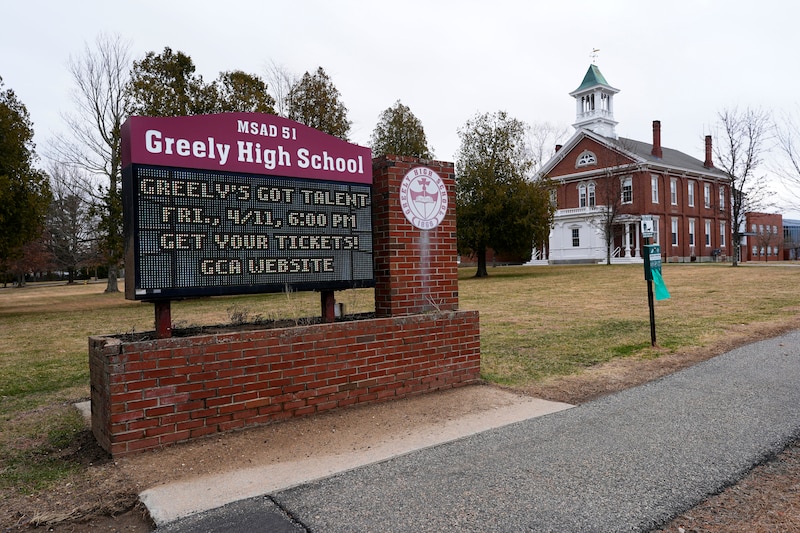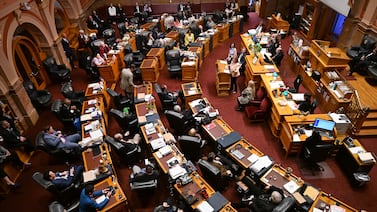Sign up for Chalkbeat’s free weekly newsletter to keep up with how education is changing across the U.S.
The winning pole vault at Maine’s Class B girls’ track and field championship in February missed the state record by 7 inches. But it was high enough to catapult Maine to the top of President Donald Trump’s enemies list.
Two weeks before that competition, Trump had signed an executive order aimed at “keeping men out of women’s sports.” The order threatened to withhold federal funding from any school that allowed athletes assigned male at birth to participate in girls’ or women’s sports.
The pole vaulter who clinched the girls’ state title was a trans athlete from a school district of 1,850 in the suburbs of Portland on Maine’s southern coast.
That same day, a Republican state legislator shared the 10th grader’s picture on Facebook, later calling it “unfair, unsafe, and unacceptable” that she had been allowed to compete. Conservative news outlets boosted the story.
The issue came to a head a few days later at a White House governors luncheon, where Trump told Maine Gov. Janet Mills that she better comply with his executive order or Maine wouldn’t get any federal funding. “See you in court,” Mills replied curtly.
That viral exchange set off a battle over not just who is protected by Title IX, the federal law that bans sex discrimination in education, but how far the president can take his aggressive and unusual approach to civil rights enforcement to reshape American education.
The Trump administration launched two overlapping civil rights investigations that rapidly determined Maine had violated Title IX. Maine officials say they are complying with their state’s human rights law, which prohibits discrimination based on gender identity, and don’t plan to back down. Now the Trump administration is taking Maine to court and moving to strip the state of its K-12 education funding — an unprecedented step.
That move could instill fear in states and schools that have policies similar to Maine’s. Educators and officials could now be wondering if they’ll be the focus of such an investigation themselves, and whether they’re ready to risk hundreds of millions of dollars in federal funding to hold onto those rules and beliefs.
What’s happening in Maine comes as the Trump administration wages war with numerous colleges and several state K-12 leaders over antisemitism on campus and diversity, equity and inclusion initiatives, respectively.
Federal officials are conducting at least 18 other investigations into school districts, state education agencies, and state athletics associations over policies involving transgender students, according to a tracker compiled by Education Week. There’s now a Title IX special investigations team tasked with wrapping up investigations quickly and preparing them for litigation.
Those backing the Trump administration’s actions say the president’s position — far from being radical — is supported by the law, common sense, and the general public.
Teresa Manning, the policy director at the National Association of Scholars, a nonprofit that advocates for conservative education policies, said the phrase “on the basis of sex” in Title IX should be interpreted by its “plain meaning” that there are two sexes, male and female, and those don’t change.
“What the Trump administration is doing is simply maintaining the status quo of how Title IX has been interpreted for 50 years,” Manning said. “It’s not like the executive orders are anything new.”
Seth Galanter, who served in the Education Department’s Office for Civil Rights during the Biden and Obama administrations, said a big reason the Maine case matters is how it will “affect trans athletes and their lives, and their ability to participate in sports.”
But he also believes the outcome of the dispute matters for all kinds of students.
“This is really an administration that is trying to bully people and schools to do what they want by discarding all the protections and norms that usually accompany a civil rights investigation,” said Galanter, who worked in the Education Department until January. “If they can do that successfully around trans kids, then they can do it around kids with disabilities, or English learner kids, or other kids who really need federal protection.”
Why trans girls playing sports is key issue for Trump
Trump made the participation of trans athletes on girls’ and women’s sports teams a signature issue of his presidential campaign. He and his supporters have said that athletes who were assigned male at birth have an unfair physical advantage over their competitors whose birth sex was female.
When trans girls medal in sporting competitions, they say, it takes honors away from cisgender girls and could reduce their shot at a college scholarship. Some cisgender girls feel uncomfortable undressing in front of trans girls in the locker room.
“A sport I had loved and had put my heart into became a sport that was painful and a constant reminder of the physical abilities that I do not have,” the Maine 12th grader who tied for second place in the girls’ pole vault championship wrote in an opinion piece for the Portland Press Herald. “How were we expected to compete with someone who would always physically dominate?”
Advocates for trans athletes, meanwhile, say it’s crucial for kids to be able to play on teams that correspond with their gender identity so they feel included at school. Trans kids are at a much higher risk for depression and suicide, and playing sports can help with self-esteem and mental health.
“Leadership, teamwork, being a good loser and a good winner — all those great benefits that sports provide, which is why sports are an important part of your education — that needs to be available to all of our students, including our transgender students,” said Sarah McDaniel, who has a trans son and is the president of the Portland chapter of PFLAG, which supports the families and friends of LGBTQ people.
Trump’s executive order focused on student athletics wasn’t his only directive focused on gender. On the first day of his second term, he also signed an executive order stating that the federal government would recognize only two sexes, male and female, and that the definition of “sex” under federal law did not include gender identity.
That helped form the policy backbone for his early February directive about trans athletes.
In addition to its threat to strip federal funds from any educational program with policies deemed “unfair to female athletes”, the executive order expressed the Trump administration’s opposition to “male competitive participation in women’s sports more broadly, as a matter of safety, fairness, dignity, and truth.”

That executive order also urged athletics organizations and states to change policies that allow trans girls to compete in women’s sports, even if they “reduce the testosterone in their bodies below certain levels or provide documentation of ‘sincerely held’ gender identity.”
Manning said the Trump administration’s swift approach to enforcing Title IX matches the issue’s urgency: “The threat to these women is happening right now. It is, right now, a violation of Title IX.”
It’s also a “political no-brainer,” Manning said, pointing to polling from January by the New York Times and Ipsos that found 79% of American adults do not think trans women should be allowed to compete on women’s sports teams. That finding mirrors other recent polls.
Trump administration takes unusual civil rights approach
The federal government’s treatment of Maine is unprecedented, multiple legal experts told Chalkbeat, from the way it carried out its investigations to the severity of the consequences it has imposed.
The Education Department has a backlog of civil rights cases and recently fired hundreds of civil rights attorneys. But it chose to open the Maine investigation unprompted by any complaints.
While any agency that gives federal funds to an educational institution can enforce Title IX, the Education Department typically leads the charge because it has the most expertise. But in this case, the Department of Health and Human Services, which usually investigates medical schools and hospital training programs, opened the first investigation, followed by the Education Department.
Both decided Maine had violated Title IX within a few weeks — though these kinds of investigations typically take many months to conclude.
Neither federal agency requested any data or documents or attempted to interview anyone from the Maine Department of Education before issuing their findings, said Danna Hayes, a spokesperson for the Maine attorney general’s office, which is representing the state’s education agency.
The Education Department’s draft agreement contained five pages of demands, including stripping any trans girl who’s ever placed in a Maine girls sports competition of her title and giving it to the athlete behind her with an apology letter. Maine should have received 90 days to consider that proposal, according to the agency’s manual. Maine got just 10.
There’s a clear process for investigating potential civil rights violations, said R. Shep Melnick, a professor of American politics at Boston College who’s studied Title IX and civil rights. The Trump administration has “done none of that.”
“I’ve been critical of OCR in the past under Biden and Obama for using investigations basically to get schools to do what they want without following these procedures, but this is far worse,” Melnick said.
The Department of Agriculture and other federal agencies targeted Maine, too.
Neither the Education Department nor the Agriculture Department responded to Chalkbeat’s questions regarding the Trump administration’s Title IX enforcement strategy and its probes in Maine.
In response to a list of questions, Emily Hilliard, a spokesperson for HHS, directed Chalkbeat to a two-sentence social media post from March 28 in which the department said it had referred its Maine Title IX investigation to the Justice Department. “HHS will continue to protect women’s sports and keep the promises of Title IX,” the post states.
Who gets to define ‘sex’?
Many biologists now think sex is more complicated than the male and female binary. But Title IX is “completely silent” on the issue of transgender athletes and does not spell out whether schools should require trans athletes to play on teams that correspond with their birth sex or their gender identity, Melnick said.
Congress could pass a law to define sex under Title IX. Or the Trump administration could go through the lengthy formal rule-making process. The Biden administration tried to define sex to include gender identity in a rule, but a federal judge threw it out. A separate Biden administration proposal that ultimately could have allowed high schools and colleges to restrict the participation of trans athletes never made it across the finish line.
The Trump administration has said Title IX “forbids” trans girls from playing on girls’ and women’s sports teams, and allowing them to do so is an outright violation of the law.
But multiple civil rights experts told Chalkbeat that’s not how Title IX is enforced under the 1979 policy interpretation that governs the Education Department’s civil rights investigations.
It’s a Title IX violation if girls lack equal access to athletics in the aggregate. For example, an investigator concerned about whether girls had the same access to athletic gear as boys would look at the equipment used by all teams, not just the tennis team.
“Identical benefits, opportunities, or treatment are not required, provided the overall effects of any differences is negligible,” the 1979 policy states.
On top of that, there are federal court rulings in two cases, one in the Ninth Circuit and another in the Fourth Circuit, that have upheld the rights of trans girls to play on teams that correspond with their gender identity.
Those cases are ongoing. But the Trump administration hasn’t said why the 14 states bound by those decisions should not follow them, Galanter said.
“It’s just completely unclear what their legal theory is here,” Galanter said.
Issue of trans athletes continues to divide Maine
On Friday, the Maine attorney general’s office told the Trump administration that the state wouldn’t agree to the Education Department’s Title IX resolution. Maine offered no counter-proposals.
“Nothing in Title IX or its implementing regulations prohibits schools from allowing transgender girls and women to participate on girls’ and women’s sports teams,” Maine’s assistant attorney general, Sarah Forster, wrote.
In response, the Education Department said it had referred the case to the Justice Department and would start the administrative process to take away Maine’s K-12 education funding. That includes discretionary grants and formula funds, the department said, which covers Title I dollars for high-poverty schools and IDEA grants for children with disabilities.
“Governor Mills would have done well to adhere to the wisdom embedded in the old idiom — be careful what you wish for,” Craig Trainor, the Education Department’s acting assistant secretary for civil rights, said Friday in a statement. “Now she will see the Trump Administration in court.”
Hayes, of the Maine attorney general’s office, declined to comment further, and the Education Department did not respond to follow-up questions from Chalkbeat.
Galanter worried a Justice Department lawsuit against Maine could make even school districts and states with gender-affirming athletics policies “really scared to have trans kids play sports, or even worse, have kids who people think are trans play on sports teams.”
“There is no way to enforce gender that isn’t gross, weird, a complete invasion of privacy,” said Bre Danvers-Kidman, the executive co-director of MaineTransNet, a nonprofit that advocates on behalf of transgender people in Maine. Kids think: “I don’t want to have to show somebody my junk to play softball.”
The issue continues to divide people in Maine.
Republican state lawmakers introduced several bills to restrict the participation of trans athletes on sports teams. Mills, Maine’s Democratic governor, said the issue is “worthy of a debate” but that for now, she will defend the state’s current laws.

Hundreds of people recently turned out to a rally to support trans youth outside Greely High School, where the winning pole vaulter is a student, including several of her classmates.
Maine School Administrative District 51, which includes Greely, did not sign a resolution agreement with HHS, but the school district responded to the Education Department’s probe.
The district had less than two weeks to reply to dozens of requests, said Melissa Hewey, the attorney representing the district, including for rosters of every girls sports team and any trans athletes playing on them, and a breakdown of how the district’s fields and equipment compare for boys and girls.
Maine has a long tradition of standing up for what it believes in, “even in the face of political pressures,” said Danvers-Kidman, who’s listened to how angry this situation has made trans kids in meetings across the state.
For their sake, Danvers-Kidman hopes Maine stands its ground.
Chalkbeat national editor Erica Meltzer contributed reporting.
Kalyn Belsha is a senior national education reporter based in Chicago. Contact her at kbelsha@chalkbeat.org.







